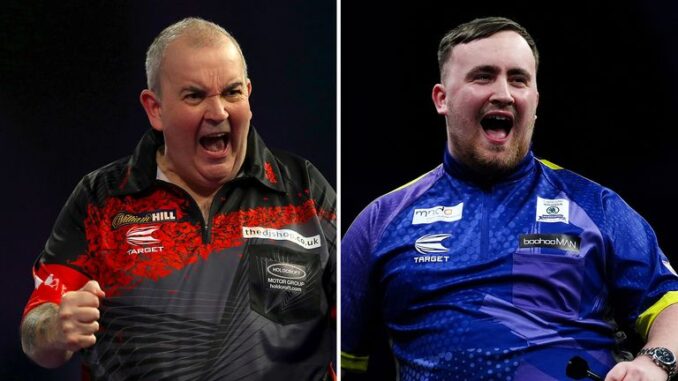
The Prodigy’s Paradox: Luke Littler and the Unwritten Chapters of a Darts Dynasty
Luke Littler, the prodigious talent who recently electrified the world stage with his stunning victory at the World Darts Championship, has ignited a firestorm of speculation with his candid remarks about his future in the sport. Just 18 years old, Littler stands poised to etch his name among the legends of darts, yet he speaks openly about the possibility of an early retirement, raising profound questions about his ambitions and the very nature of athletic pursuit.
“I won’t be playing at 50,” Littler stated definitively, casting a shadow of doubt over the prospect of a long and storied career. “I could wake up tomorrow, the fire’s gone out of my belly, and I wanna retire. So maybe I can’t achieve it.” These words, delivered with a maturity that belies his age, have reverberated throughout the darts community, sparking conversations about Littler’s motivations and the potential trajectory of his career.
While many envision Littler following in the footsteps of iconic figures like Phil Taylor, whose staggering 16 world titles represent the pinnacle of darting achievement, the young champion appears to be charting a different course. The allure of breaking records and cementing his place in history is undeniable, yet Littler’s focus remains firmly rooted in the present, in the simple joy of the game itself.
“Everyone would like to do that,” Littler conceded, acknowledging the allure of matching Taylor’s monumental accomplishment. “It will take some doing. I have a better chance to win 16 or more on grounds of age being on my side. I want to do this as long as I enjoy it.” This sentiment underscores Littler’s refreshingly pragmatic approach. For him, success isn’t solely defined by the accumulation of trophies or the pursuit of statistical milestones; it’s about the intrinsic satisfaction derived from competing at the highest level. The moment that enjoyment wanes, Littler suggests, he’ll be ready to walk away, regardless of his accomplishments.
“You can’t step on stage or speak honestly to people if you’ve lost the love to do it,” Littler explained, articulating a philosophy that prioritizes authenticity and passion. “That’s when I would stop. I don’t know yet.” This perspective offers a stark contrast to the often relentless pursuit of victory that characterizes professional sports. In a world where athletes are frequently defined by their triumphs and driven by external pressures, Littler places a premium on his own well-being and the genuine love for his craft. His willingness to forgo potential future glory in favor of maintaining his passion speaks volumes about his character and his unwavering commitment to his own happiness.
Littler’s perspective echoes the sentiments of other top athletes who have emphasized the importance of intrinsic motivation. He recalled a conversation with fellow darts star Michael van Gerwen, who articulated a similar philosophy. “Michael (van Gerwen) said this in a different interview – once the fire goes out your belly, there’s just no point in playing,” Littler recounted. “So if I say I’m going to continue playing darts for 30 years, well I could wake up tomorrow morning, the fire’s gone out of my belly, and I wanna retire.” This resonates with many who believe that true success lies in finding fulfillment and purpose in one’s pursuits, rather than simply chasing accolades. Littler’s willingness to walk away from a potentially lucrative and record-breaking career underscores his commitment to this principle.
The rapid growth and evolution of professional darts also plays a role in Littler’s thinking. “I probably won’t be playing at 50,” he reiterated, emphasizing his long-term vision. “It’s just the way the sport’s going. It’s just growing, growing and growing.” He recognizes the increasing demands of the sport, the constant travel, the intense pressure, and the potential for burnout. While he currently thrives in this environment, he acknowledges the possibility that his perspective may change as he matures and the sport continues to evolve.
Littler’s comments have undoubtedly injected an element of uncertainty into the narrative surrounding his career. Will he become the dominant force that many predict? Will he challenge Phil Taylor’s record and establish a dynasty of his own? Or will he choose a different path, one that prioritizes personal fulfillment over sporting immortality? The answers to these questions remain elusive, but one thing is certain: Luke Littler’s journey, regardless of its ultimate destination, will be a compelling testament to the importance of following one’s heart and defining success on one’s own terms. He embodies a new generation of athletes who are not afraid to prioritize their well-being and happiness, even if it means deviating from the traditional script of athletic ambition. Whether he goes on to shatter records or chooses to retire early, Littler’s story serves as a reminder that true greatness lies not just in achieving external accolades, but also in staying true to oneself and one’s passions.
Leave a Reply